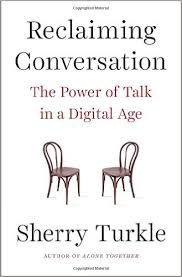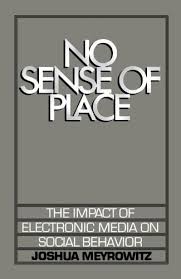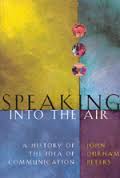Good studies of human communication force us to rethink assumptions that are sometimes more comfortable than accurate. They give new life to the familiar and routine.
This very selective sample of books about communication is wide-ranging, mixing history and media theory with some far-ranging discussions of what is possible in human communication. Some of these studies are recent and helpful in understanding how digital media have altered social relationships. Others were published years ago, but will be thought-provoking for anyone interested in exposing the inner layers of communication. They are listed in approximate order of their accessibility to a general reader.
- Robert M. Pirsig, Zen and the Art of Motorcycle Maintenance (William Morrow, 1974). This multi-million-seller which recently celebrated its 40th anniversary is many things: a narrative of a troubled life, a road-trip saga, an account of different modes of thinking, and an evocative introduction to Plato’s concerns about the corruptions of communication. Pirsig weaves all of these threads into a coherent personal narrative focused on his friends and his son. He’s especially intrigued that his chosen field of study, rhetoric, was borne under the dark cloud of intellectual illegitimacy. Plato argued this negative theme in various ways over the course of his life. It’s a claim that Pirsig wants to explore, sometimes while sitting on the saddle of an aging Henderson as he travels through America’s northern plains. Along the way the main event of the narrative is his active mind, considering everything from intellectual black holes to the nature of insanity.
- Erving Goffman, The Presentation of Self in Everyday Life (Anchor Books, 1959). Goffman was a professor at the University of Pennsylvania, conducting

Erving Goffman research that had a global reach. His methodology of deep observation of everyday events provides all kinds of insights about the intricacies of even simple interactions. The book remains a stalwart for anyone interested in the sociology and communication, and for good reason. His observations of everyday settings–restaurants especially fascinated him–is the perfect antidote to the bland survey research that now dominates so much of the social sciences. And because he helps us see the familiar in new ways, he’s fun to read.
 Neal Gabler, An Empire of Their Own: How the Jews Invented Hollywood (Anchor, 1998). Gabler’s study of the first film entrepreneurs is a wonderful piece of social history that is especially timely in the current climate of narrow nativist sentiment. Gabler documents our debt to a select group of Eastern European Jews who gave us the Hollywood film factories. These men were driven to turn out reliable middle-class visions of the American dream, even though they were the victims of virulent anti-Semitism. The ironic result is that they were sometimes kept out of key institutions in the very town they created. The book also confirms how vital film and its modern forms remain to understanding the American experience.
Neal Gabler, An Empire of Their Own: How the Jews Invented Hollywood (Anchor, 1998). Gabler’s study of the first film entrepreneurs is a wonderful piece of social history that is especially timely in the current climate of narrow nativist sentiment. Gabler documents our debt to a select group of Eastern European Jews who gave us the Hollywood film factories. These men were driven to turn out reliable middle-class visions of the American dream, even though they were the victims of virulent anti-Semitism. The ironic result is that they were sometimes kept out of key institutions in the very town they created. The book also confirms how vital film and its modern forms remain to understanding the American experience.
 Nicholas Carr, The Shallows: What the Internet is Doing to Our Brains (Norton, 2011). Carr’s popular book makes the case that the pacing and fragmentation of internet content is undermining our abilities to be critical thinkers. Though this study has produced a number of doubters, he is mostly convincing in describing how heavy doses of screen time have altered our abilities to concentrate and focus. We may be schooling ourselves out of the kind of rigorous concentration that has contributed mightily to human progress. His observations raise questions that everyone who is part of the wired planet should consider.
Nicholas Carr, The Shallows: What the Internet is Doing to Our Brains (Norton, 2011). Carr’s popular book makes the case that the pacing and fragmentation of internet content is undermining our abilities to be critical thinkers. Though this study has produced a number of doubters, he is mostly convincing in describing how heavy doses of screen time have altered our abilities to concentrate and focus. We may be schooling ourselves out of the kind of rigorous concentration that has contributed mightily to human progress. His observations raise questions that everyone who is part of the wired planet should consider.
 Sherry Turkle, Reclaiming Conversation: The Power of Talk in a Digital Age (Penguin, 2015). In this useful and eminently readable study, the M.I.T. researcher explains why conversation as the default model for communication is threatened. Using this benchmark, she offers extensive interviews with children and young adults that suggest a drift toward preferences for connecting that weaken links to full and vital face to face exchanges. Her concern is how to maintain the natural social natures of our children, who now fear the unpredictability of direct contact with others. As she notes in her conclusion, “We want more from technology and less from each other. What once would have seemed like ‘friendly service’” from a sales clerk has “now become an inconvenience that keeps us from our phones.”
Sherry Turkle, Reclaiming Conversation: The Power of Talk in a Digital Age (Penguin, 2015). In this useful and eminently readable study, the M.I.T. researcher explains why conversation as the default model for communication is threatened. Using this benchmark, she offers extensive interviews with children and young adults that suggest a drift toward preferences for connecting that weaken links to full and vital face to face exchanges. Her concern is how to maintain the natural social natures of our children, who now fear the unpredictability of direct contact with others. As she notes in her conclusion, “We want more from technology and less from each other. What once would have seemed like ‘friendly service’” from a sales clerk has “now become an inconvenience that keeps us from our phones.”
 Joshua Meyrowitz, No Sense of Place (Oxford, 1986). Although written a number of years ago and in advance of widespread use of the internet, Meyrowitz still makes what I believe is the single best case that newer forms of human communication have undermined the psychological security that came with living only in real space and time. The book is revelatory in its assessment of how visual media work as irresistible magnets for our attention, and how visual media often weaken connections that truly matter. Given his use of seminal thinkers like Goffman and Susanne Langer, Meyrowitz’s framework for assessing communication processes is unsurpassed. By the end of the book he’s offered a haunting intellectual case for how electronic media have undermined the sources of personal identity.
Joshua Meyrowitz, No Sense of Place (Oxford, 1986). Although written a number of years ago and in advance of widespread use of the internet, Meyrowitz still makes what I believe is the single best case that newer forms of human communication have undermined the psychological security that came with living only in real space and time. The book is revelatory in its assessment of how visual media work as irresistible magnets for our attention, and how visual media often weaken connections that truly matter. Given his use of seminal thinkers like Goffman and Susanne Langer, Meyrowitz’s framework for assessing communication processes is unsurpassed. By the end of the book he’s offered a haunting intellectual case for how electronic media have undermined the sources of personal identity.
 John Durham Peters, Speaking Into the Air (University of Chicago, 1999). Peters is a Professor of Communication Studies at the University of Iowa and a frequent critic of the common but mistaken assumptions we have for communication. The Introduction to this book is alone worth a look. It takes apart most of the cherished myths we hold, among them: that communication is the best pathway for settling long-standing differences, and the idea that disagreement is just a matter of misunderstanding. From his very first sentence that “Communication is a registry of modern longings” a reader can sense a study that will offer challenging arguments and interesting insights. The references in the book are sometimes obscure. But every chapter has interesting observations, most of which come by quoting writers and thinkers who were experiencing the powers of telegraphy and the telephone for the first time. Peters also has surprising things to say about communicating with machines, animals and perhaps other sentient beings “out there” in the universe.
John Durham Peters, Speaking Into the Air (University of Chicago, 1999). Peters is a Professor of Communication Studies at the University of Iowa and a frequent critic of the common but mistaken assumptions we have for communication. The Introduction to this book is alone worth a look. It takes apart most of the cherished myths we hold, among them: that communication is the best pathway for settling long-standing differences, and the idea that disagreement is just a matter of misunderstanding. From his very first sentence that “Communication is a registry of modern longings” a reader can sense a study that will offer challenging arguments and interesting insights. The references in the book are sometimes obscure. But every chapter has interesting observations, most of which come by quoting writers and thinkers who were experiencing the powers of telegraphy and the telephone for the first time. Peters also has surprising things to say about communicating with machines, animals and perhaps other sentient beings “out there” in the universe.
Comments: Woodward@tcnj.edu


